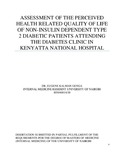| dc.contributor.author | Genga, Eugene Kalman | |
| dc.date.accessioned | 2013-11-12T07:29:24Z | |
| dc.date.available | 2013-11-12T07:29:24Z | |
| dc.date.issued | 2013 | |
| dc.identifier.citation | Master of Medicine | en |
| dc.identifier.uri | http://erepository.uonbi.ac.ke:8080/xmlui/handle/11295/58587 | |
| dc.description.abstract | BACKGROUND: Diabetes Mellitus is a common and demanding health related problem that has a wide effect on every day’s life of the patients. It can have a profound effect on quality of life in terms of social and psychological well-being as well as physical ill-health. It is one of the most psychologically demanding of the chronic diseases; with psychosocial factors pertinent to nearly every aspect of the disease and its treatment.
OBJECTIVE: To Assess the perceived Health-related quality of life of diabetic patients not on insulin therapy using the WHOQoL-Bref (World Health Organization Quality of Life – Brief).
STUDY DESIGN: This was a cross-sectional study.
STUDY SITE: The study was conducted on patients attending the diabetic clinic at Kenyatta
National Hospital.
RESULTS: Study recruited 139 patients with type2 diabetes not on insulin therapy. The study population was predominantly female (61%) , majority were 40-60yrs, having had diabetes for less than 5yrs, 75% having more than one complication. Most (75%) of the study participants were poorly controlled with HbA1C mean score of 8.04% .Majority of the study participants( 84%) achieved a good score on the HRQoL scale using the WHOQoL-BREF tool. The determinants of HRQoL in our study were: age of study participants, duration of diabetes, presence of complications and income related factors. Age of the study subjects had significant association only in the social domain of HRQoL with a p-value of 0.037. Level of income had a significant association with overall HRQoL score (p-value of 0.029), psychological domain (p value of 0.023) and in the social domain (p-value of 0.029). Health care financing was significantly associated with psychological domain (p-value 0.006) and environmental domain (p-value 0f 0.04) and overall score (p-value 0.011). There was an association between employment status and HRQoL.
Having a job improved the scores in physical domain (p-value of 0.013) and social domain (p value of 0.020). Duration with diabetes had significant association with physical domain where the p value was 0.007. The HRQoL of the study subjects was associated significantly with the number of complications. Indeed the association of complications with the HRQoL involved physical domain (p-value of <0.0001) and psychological domain (p-value of 0.041) which directly impacted on the overall total score (p value of 0.041).
CONCLUSION: The results of this study show that diabetes affected HRQoL of our study participants. There is a need for interventions programs to improve glycemic control and inclusion of HRQoL assessment as part of patients on follow up. Age and duration of disease are not modifiable but complications can be reduced by better health care initiaves. Income-related factors can be modifiable through poverty alleviation and pooled health care financing. | en |
| dc.language.iso | en | en |
| dc.publisher | University of Nairobi | en |
| dc.title | Assessment of the perceived health related quality of life of non-insulin dependent type 2 diabetic patients attending The diabetes clinic in kenyatta national hospital | en |
| dc.type | Thesis | en |
| dc.description.department | a
Department of Psychiatry, University of Nairobi, ; bDepartment of Mental Health, School of Medicine,
Moi University, Eldoret, Kenya | |
| local.publisher | School of Medicine | en |

